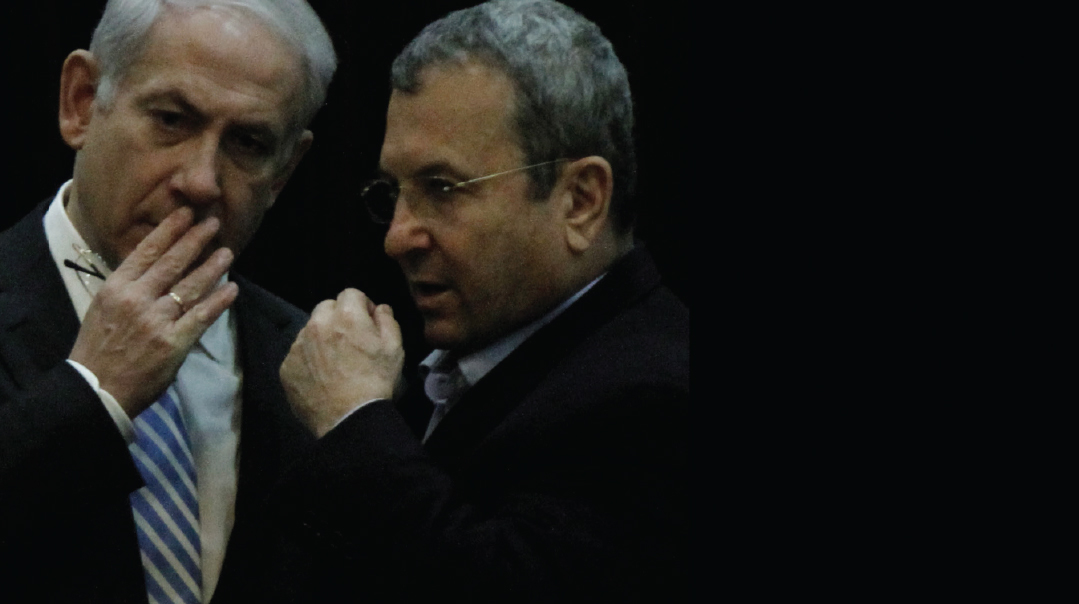For Barak and Bibi, It’s Personal

Aborted attack? How today’s Bibi-Barak showdown was born

P
Bibi Netanyahu is desperate.
Internal polling at Likud shows that a coalition of right-wing parties will fail to form a governing majority without the assistance of Avigdor Lieberman, the thorn in Netanyahu’s side who forced him to call new elections after the Likud produced a convincing victory in April.
That’s why Netanyahu ally and Knesset speaker Yuli Edelstein last week floated the idea of canceling the September elections and forming a new government by enticing the Blue and White party to join the Likud. That idea, however, was quickly rejected, both by the relevant politicians and by the attorney general, who said such a move would be illegal.
Since that time, Netanyahu’s situation has turned even more perilous with the entrance of Ehud Barak to the election campaign. The former prime minister and general is expected to ally himself with Labor and Meretz in a bid to win a key position in the next government. Alongside him in his new party is retired general Yair Golan, a former deputy chief of staff for the Israel Defense Forces. Never have so many generals run in a general election.
Barak’s appearance in the campaign does more than just complicate the electoral math. He is a committed enemy of the prime minister and the only politician in the race who has defeated Netanyahu at the polls. Over the past few years, Barak, 77, has regularly and ferociously condemned Netanyahu on everything from Gaza and Iran to his legal troubles. But the two men weren’t always enemies.
According to a new book, Storm on the Path to Iran by Ilan Kfir, the hostility began with disagreement over a plan to strike and destroy Iran’s nuclear facilities. “Netanyahu was determined to go forward with military action against Iran. But for then-chief of staff Benny Gantz to order the top command to prepare the forces for the airborne strike, he needed the support and consent of one man — the defense minister, Barak,” writes Kfir.
According to Kfir’s account, in mid-October 2012, satellites operated by American intelligence agencies began picking up images of two unidentified planes approaching Iran from the west every night. The two planes were flying at an altitude of 50,000 feet and a speed of 1.6 Mach; they would cross the border into Iran before abruptly turning back and flying east.
The Wall Street Journal reported at the time that the Pentagon had determined conclusively that the planes were F-16 Fighting Falcons and belonged to the Israeli Air Force. Analysts in the Central Intelligence Agency and the Defense Department determined that Israel planned to attack Iran’s nuclear facilities. The date of the operation was set for the third week of October 2012, two weeks before then-president Barack Obama would face Republican nominee Mitt Romney in his reelection bid.
The relationship between the two leaders, Netanyahu and Obama, was at that point at a nadir. Neither trusted the other, which is why Obama concluded that Netanyahu was gambling big. If Israel attacked Iran, Netanyahu calculated that Obama would have no choice but to support Israel rhetorically and assist it militarily when the Iranians counterattacked. Moreover, the timing of the attack would give Obama little time to consider his options. If he didn’t act, he might look weak and risk losing the election.
In the end, more than 100 Israeli fighter jets that were expected to participate in the attack never took off and the Iranian nuclear installations at Fordow, Arak, and Natanz were never destroyed. What happened?
According to Kfir, the man who put the kibosh on the plan was Ehud Barak. At that very moment in October 2012, Kfir writes, Barak was in the United States consulting with Obama national security advisor Tom Donilon. Like the Obama team, Barak wanted to stop Netanyahu from attacking Iran, and the two sides worked in tandem to stymie the operation. Barak, it is only fair to note, denies the accusation categorically.
Whatever really happened, the personal relationship between two of the most powerful personalities in Israeli politics, Netanyahu and Barak, has never recovered and is marked by deep personal animosity. Now, that rivalry will become part of the election campaign.
(Originally featured in Mishpacha, Issue 767)
Oops! We could not locate your form.













